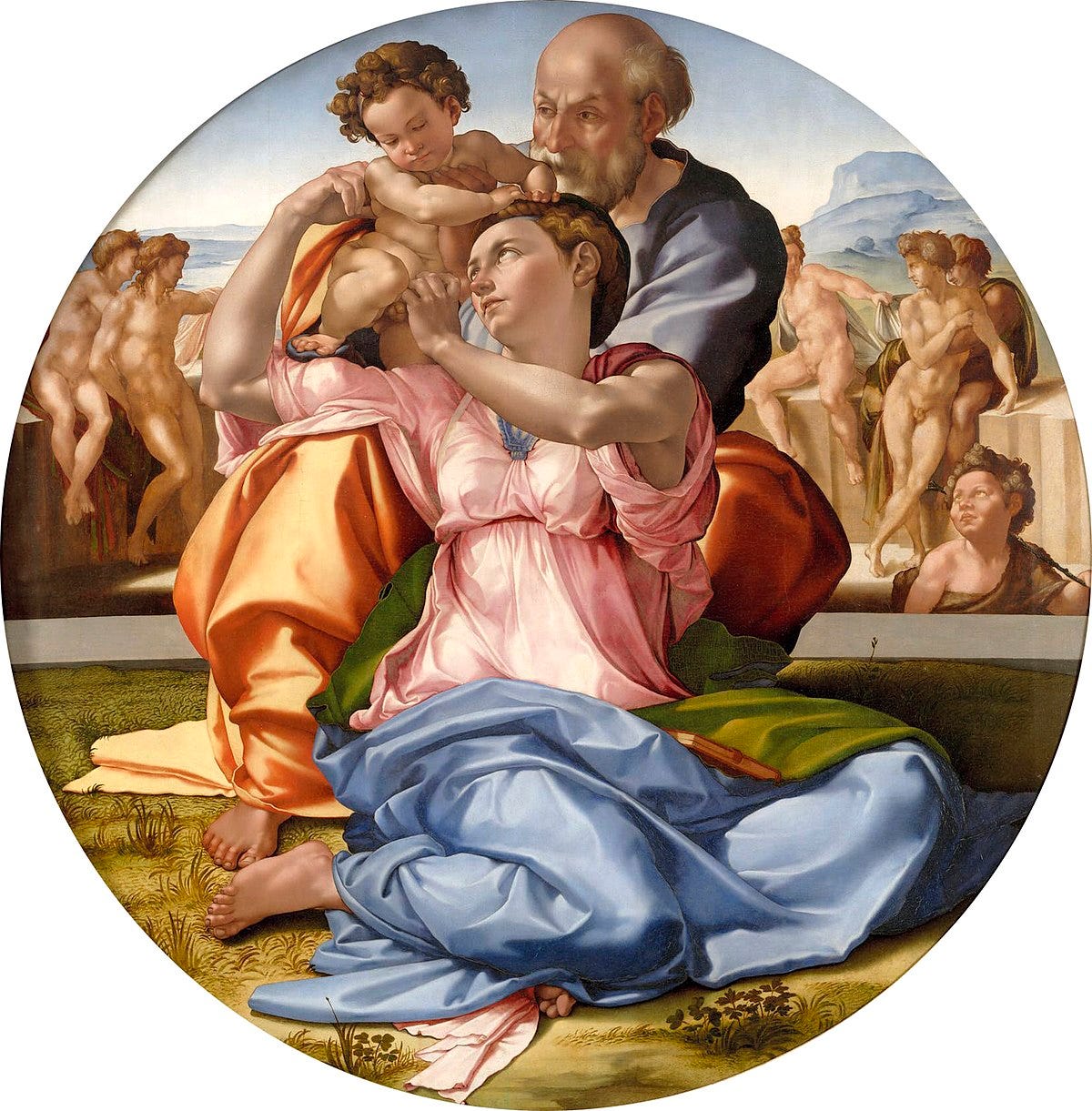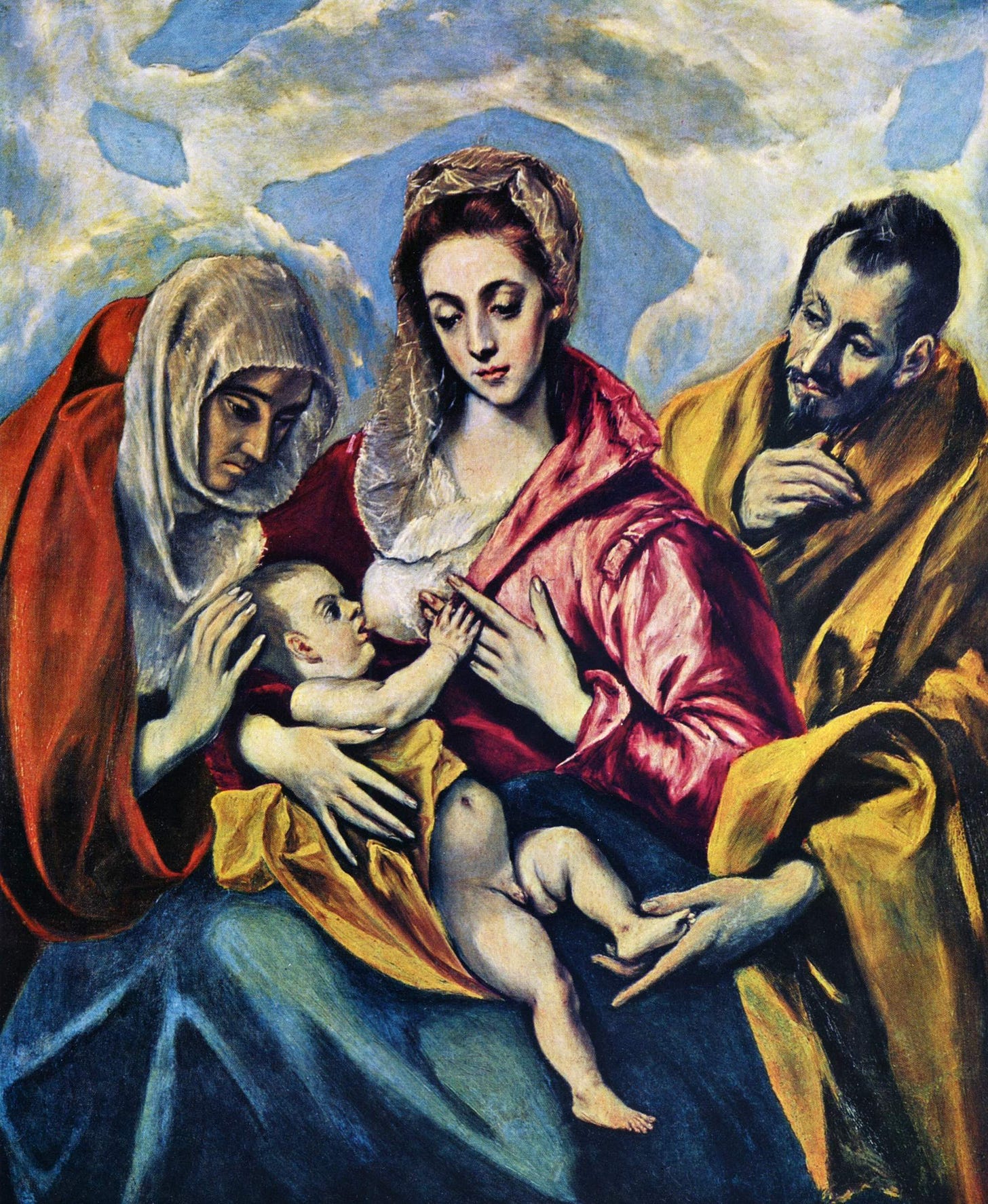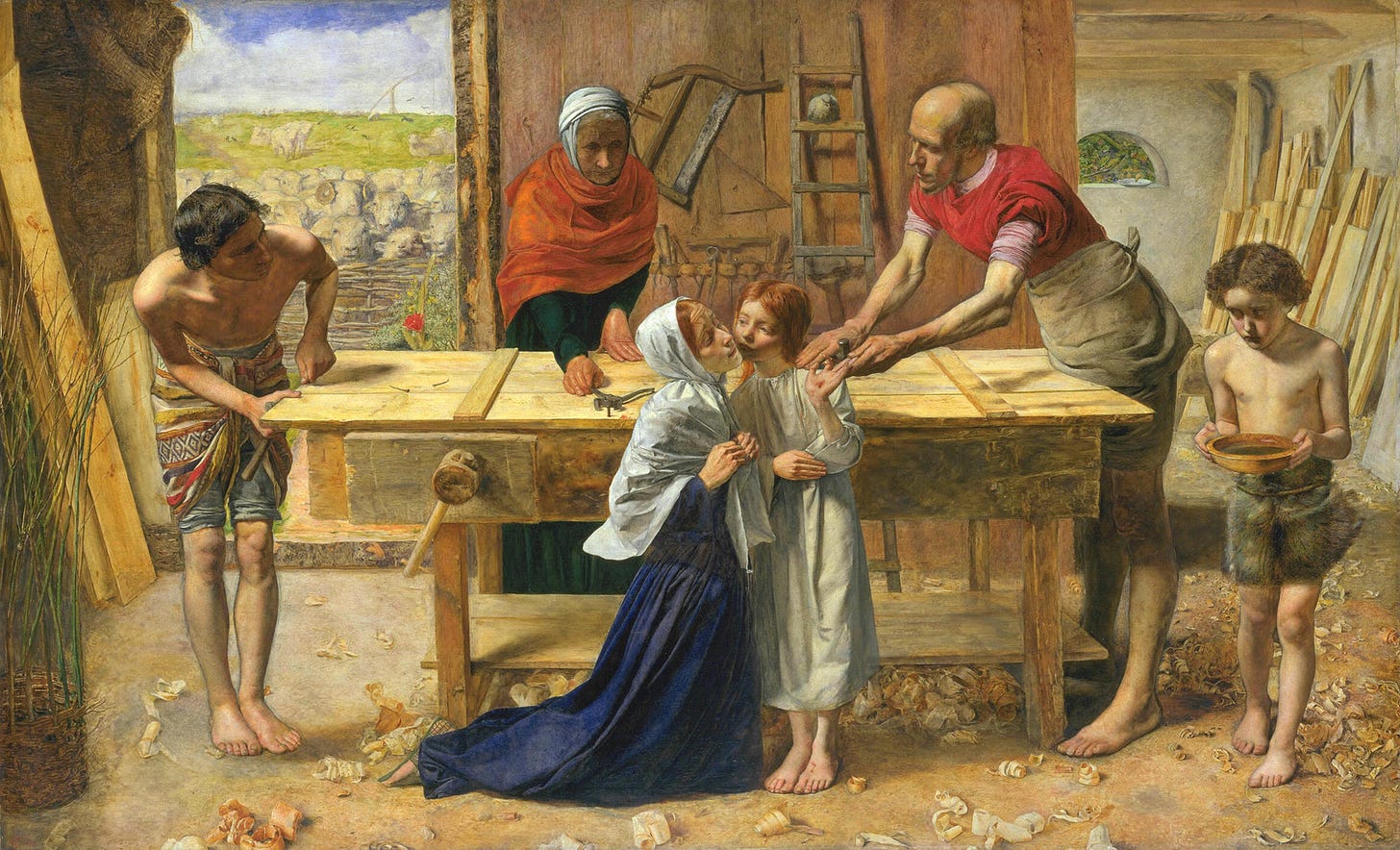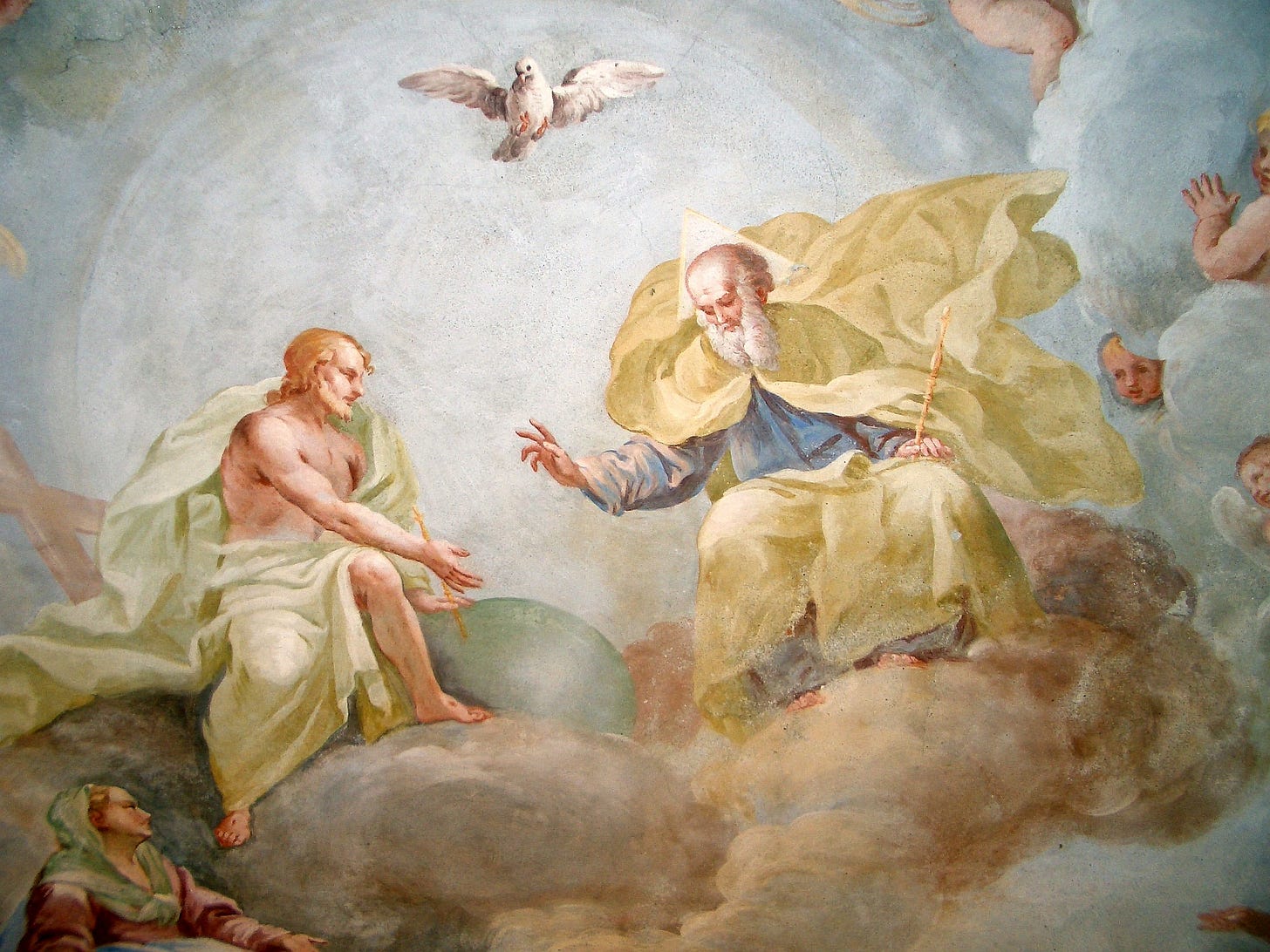Feast of the Holy Family of Jesus, Mary and Joseph
How I would like to return to my childhood and attend the simple yet profound school that is Nazareth!
Over the course of six years, Pope Benedict XVI gave several reflections on the mystery of the Holy Family at the Sunday Angelus. I noticed a particular theme developed while reading them:
In the Gospel we do not find discourses on the family but an event which is worth more than any words: God wanted to be born and to grow up in a human family. In this way he consecrated the family as the first and ordinary means of his encounter with humanity.
This Gospel episode reveals the most authentic and profound vocation of the family: that is, to accompany each of its members on the path of the discovery of God and of the plan that he has prepared for him or her.
Mary and Joseph taught Jesus primarily by their example: in his parents he came to know the full beauty of faith, of love for God and for his Law, as well as the demands of justice, which is totally fulfilled in love (see Rom 13: 10).
From them he learned that it is necessary first of all to do God’s will, and that the spiritual bond is worth more than the bond of kinship.
The Holy Family of Nazareth is truly the “prototype” of every Christian family which, united in the Sacrament of Marriage and nourished by the Word and the Eucharist, is called to carry out the wonderful vocation and mission of being the living cell not only of society but also of the Church, a sign and instrument of unity for the entire human race.
The Second Vatican Council dedicated much attention to the family. Married partners, it said, must be witnesses of faith to each other and to their children (see Lumen Gentium, no. 35). The Christian family thus shares in the Church’s prophetic vocation: with its way of living it “proclaims aloud both the present power of the Kingdom of God and the hope of the blessed life” (ibid.).
In contemplating the mystery of the Son of God who came into the world surrounded by the love of Mary and Joseph, I ask Christian families to experience the loving presence of the Lord in their lives. I likewise encourage them, drawing inspiration from Christ’s love for humanity, to bear witness to the world of the beauty of human love, marriage and the family.
Jesus willed to be born and to grow up in a human family; he had the Virgin Mary as his mother and Joseph who acted as his father; they raised and educated him with immense love. Jesus’ family truly deserves the title “Holy”, for it was fully engaged in the desire to do the will of God, incarnate in the adorable presence of Jesus. On the one hand, it was a family like all others and as such, it is a model of conjugal love, collaboration, sacrifice and entrustment to divine Providence, hard work and solidarity — in short, of all those values that the family safeguards and promotes, making an important contribution to forming the fabric of every society. At the same time, however, the Family of Nazareth was unique, different from all other families because of its singular vocation linked to the mission of the Son of God. With precisely this uniqueness it points out to every family and in the first place to Christian families God’s horizon, the sweet and demanding primacy of his will, the prospect of Heaven to which we are all destined.
Dear families, do not let the love, openness to life and incomparable ties that unite your home weaken. Ask God for this constantly, pray together so that your resolutions may be enlightened by faith and strengthened by divine grace on the path to holiness. Thus, with the joy of sharing all things in love, you will give the world a beautiful witness to how important the family is for the human person and for society.
God had chosen to reveal himself by being born into a human family and the human family thus became an icon of God! God is the Trinity, he is a communion of love; so is the family despite all the differences that exist between the Mystery of God and his human creature, an expression that reflects the unfathomable Mystery of God as Love. In marriage the man and the woman, created in God’s image, become “one flesh” (Gen 2: 24), that is a communion of love that generates new life. The human family, in a certain sense, is an icon of the Trinity because of its interpersonal love and the fruitfulness of this love.
Jesus’ decision to stay on at the Temple was above all the result of his close relationship with the Father, but it was also a result of the education he had received from Mary and Joseph. Here we can glimpse the authentic meaning of Christian education: it is the fruit of a collaboration between educators and God that must always be sought. The Christian family is aware that children are a gift and a project of God. Therefore it cannot consider that it possesses them; rather, in serving God’s plan through them, the family is called to educate them in the greatest freedom, which is precisely that of saying “yes” to God in order to do his will.
One of the greatest services that we Christians can render our fellow human beings is to offer them our serene and unhesitating witness as a family founded on the marriage of a man and a woman, safeguarding and promoting the family, since it is of supreme importance for the present and future of humanity. Indeed, the family is the best school at which to learn to live out those values which give dignity to the person and greatness to peoples. In the family sorrows and joys are shared, since all feel enveloped in the love that prevails at home, a love that stems from the mere fact of belonging to the same family. I ask God that in your homes you may always breathe this love of total self-giving and faithfulness which Jesus brought to the world with his birth, nurturing and strengthening it with daily prayer, the constant practice of the virtues, reciprocal understanding and mutual respect.
The family is designed by God to be the first witness and sign of the mystery of Christ. In the Holy Family of Jesus, Mary, and Joseph, this purpose of the family is made explicit. Christ himself learns from Mary and Joseph, primarily by their witness of love, the way to fulfill his mission (Heb 10:7: “Behold, I come to do your will.”) Their family is called “holy” because of their total dedication to seeking and obeying the will of God. The Christian family today shares in the prophetic mission of the Church and, in a certain sense, is the privileged place where that mission begins. The Christian family is a prophetic sign, a witness and revelation to the world, of the love of God himself in his own inner Trinitarian life — the love that shares all things, the love that is total self-giving and faithfulness — by imitating that love in their own family life. The Christian family will understand its own calling and nourish and sustain its living out of that calling by contemplating the image of the Holy Family. By its simple faithfulness to that love that constitutes their identity, before any other extraordinary acts or services, the Christian family will offer an incomparable service to others — simply by their witness, that icon of action and living that is the most powerful word we can preach.
The Second Reading this Sunday teaches that we should take on love, “the bond of perfection,” even above compassion, kindness, humility, gentleness, patience, and forgiveness.
Fundamentally, marriage is a bond. The mystery of salvation, too, is a bond (a covenant). The perfection of consecrated life consists of a bond (a vow), whose inner form is that obedience of love. The Christian life begins in the bond (assent) of faith, which must be total by its nature (you either totally believe that God is speaking or you don’t). Hope is a bond, not a wish, relying as it does on God’s promises, who has bound himself by his covenant to us in Christ.
As the Gospel tells us, Jesus was obedient to his parents. But he was also obedient to his Heavenly Father, with whom there could be no conflict. This explains what could seem to be a flippant reply to his mother is not.
In the Collect (Opening Prayer) for Mass, we pray that “we may imitate [the Holy Family] in practicing the virtues of family life and in the bonds of charity, and so, in the joy of [God’s] house, delight one day in eternal rewards.”
Not all of us have had good experiences of family. But we are all called to find the fullness of what the family reveals in the family-bond of the Church. That we don’t is a sad commentary and an admonishment to reform. If our churches are units of disparate atoms, whether those be individuals or families, whom we glimpse and salute but do not share all things with (at least in principle, according to a supernatural order, not dispensing with but building upon a natural order and prudence), then we are failing in our mission.
The Feast of the Holy Family is certainly a moment of renewal for all natural families: but more importantly, it is a moment of renewal for the Church, for whose sake the institution of the family exists and is ordered, supernaturally. The Church needs holy families both to understand who she is and to be filled with holy members; but holy families and the Christian persons therein need the Family of the Church so that their love does not grow frustrated and invert the image they should reveal, turned in on itself instead of out toward others.
To learn how to be the Family of God, we need to contemplate again the Holy Family, as Pope Saint Paul VI famously said: “How I would like to return to my childhood and attend the simple yet profound school that is Nazareth!” To return and discover who Jesus is and what he came to do so that we might follow him. Not as individuals: because there is no such mere thing in the final analysis. Not as individuals, because you can’t get there as individuals. But as a communio personarum, a communion of persons, an icon of the Holy Trinity. Whose very life, after all, is our destiny.
First Reading for Matins: Eph 5:21-6:4: "For this reason a man shall leave his father and his mother and be joined to his wife, and the two shall become one flesh." This is a great mystery, but I speak in reference to Christ and the church.
Second Reading for Matins: From an address by Pope Paul VI: Nazareth is a kind of school where we may begin to discover what Christ’s life was like and even to understand his Gospel. Here we can observe and ponder the simple appeal of the way God’s Son came to be known, profound yet full of hidden meaning. And gradually we may even learn to imitate him.
Gospel Canticle for Vespers I: The child Jesus remained in Jerusalem and his parents did not know it. They thought he was in the group of travelers and looked for him among their relatives and friends.
Gospel Canticle Antiphon for Lauds: Lord, give us light through the example of your family and guide our feet into the way of peace.
Gospel Canticle for Vespers II: Son, why have you done this to us? Think what anguish your father and I have endured looking for you. But why did you look for me? Did you not know that I had to be in my Father's house.
Entrance Antiphon: (Lk 2:16) The shepherds went in haste, and found Mary and Joseph and the Infant lying in a manger.
Collect: O God, who were pleased to give us the shining example of the Holy Family, graciously grant that we may imitate them in practicing the virtues of family life and in the bonds of charity, and so, in the joy of your house, delight one day in eternal rewards.
First Reading: Sir 3:2-6, 12-14: God sets a father in honor over his children; a mother’s authority he confirms over her sons. Whoever honors his father atones for sins, and preserves himself from them. When he prays, he is heard; he stores up riches who reveres his mother.
Responsorial Psalm: Ps 128: Blessed is everyone who fears the LORD, who walks in his ways!
Second Reading: Col 3:12-21: Put on, as God’s chosen ones, holy and beloved, heartfelt compassion, kindness, humility, gentleness, and patience, bearing with one another and forgiving one another…. And over all these put on love, that is, the bond of perfection.
Gospel Antiphon: (Col 3:15a, 16a) Let the peace of Christ control your hearts;
Let the word of Christ dwell in you richly.
Gospel: Lk 2:41-52: He went down with them and came to Nazareth, and was obedient to them; and his mother kept all these things in her heart. And Jesus advanced in wisdom and age and favor before God and man.
Offertory Antiphon: In you have I put my trust, O Lord; I said: "You are my God, my destiny is in your hands."
Communion Antiphon: (Bar 3:38) Our God has appeared on the earth, and lived among us.







